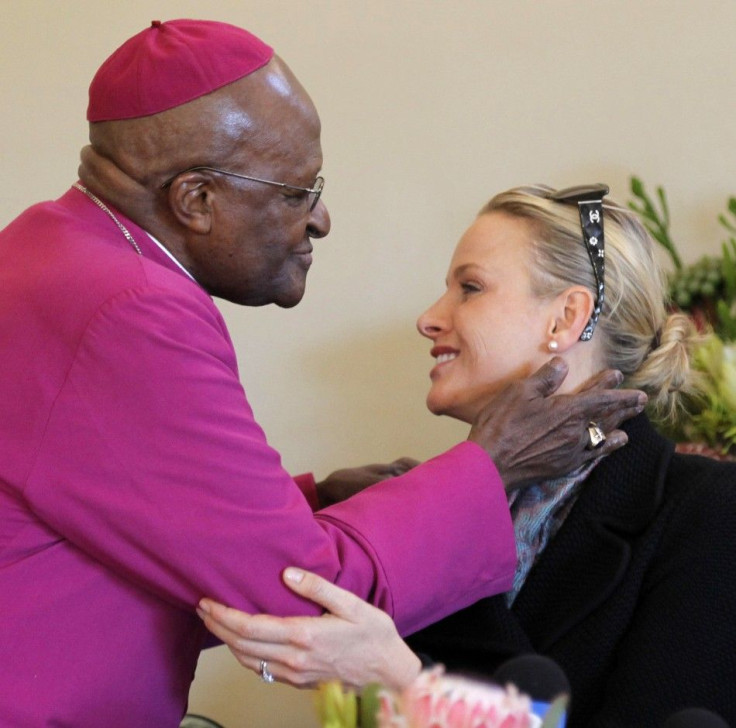S.Africa's Tutu fetes 80th birthday amid controversy

South African peace icon Archbishop Desmond Tutu celebrated his 80th birthday on Friday in the church where he preached against apartheid, just a few days after saying the former liberation movement now in government was in some ways even worse.
Tutu, who won the Nobel Peace Prize in 1984 for speaking out against white minority rule, has remained one of the world's most celebrated figures and is widely seen as South Africa's moral compass.
Rock stars, politicians and parishioners packed St Georges Cathedral in Cape Town for a service to celebrate the man who sits on a panel of global statesmen.
A day earlier, the diminutive Tutu filled separate birthday ceremonies with his enormous laughter and took to the stage with an African dance troupe.
There is only one rock star in this room, and it's Archbishop Desmond Tutu, said U2 front man Bono, one of the celebrities joining the cleric for the three-day celebrations.
While birthday wishes have been streaming in, the festivities have been marred by a row with the ANC over its failure to grant the Dalai Lama a visa to attend the celebrations on Tutu's invitation.
Tutu regularly criticises the African National Congress, in power since the end of apartheid in 1994, but his outburst this week was one of the harshest ever and prompted widespread concern in the ruling party.
He said the ANC's failure to allow fellow Nobel Laureate, the Dalai Lama, into the country amounted to pandering to major trade partner China and accused the party of conduct worse than that of South Africa's former white-minority rulers.
Tutu said the action from President Jacob Zuma's government, which had the visa application for weeks but failed to make a decision, was a national disgrace.
Tutu said Zuma did not represent him and warned that one day people would pray for the demise of the ANC.
The Arch, as he is affectionately known, thanked Deputy President Kgalema Motlanthe for attending the church celebrations on Friday.
Motlanthe was in Beijing a week ago where he shared toasts Chinese leaders, who have called the Dalai Lama a dangerous separatist, and won pledges for $2.5 billion in investment in South Africa.
Thank you for coming, despite some of the hiccups we have had, Tutu said.
In what may be seen as a show of anger by Zuma, the president said in a birthday greeting that Tutu was admired by thousands in a country with a population of nearly 50 million.
Tutu's rebuke sparked soul-searching, with many ANC supporters and newspapers saying the visa flap was symbolic of the failings of the party that helped end apartheid but was now failing to live up to the ideals of the movement it had been.
He has the gravitas, like no other leader, to say things and be heard, said Susan Booysen, political analyst at Wits University.
POWER OF THE PULPIT
Tutu, who retired about a year ago from most public duties, has remained a prominent figure and is still seen as a voice of integrity.
In his last major appearance, when South Africa hosted the soccer World Cup in 2010, he danced on stage with pop music luminaries Black Eyed Peas before the opening match.
Under apartheid, his position in the church gave him a prominent national platform from which to criticise the apartheid system and call for equal rights and education.
His use of this platform incurred the wrath of the white minority government, which tried to prevent him travelling by revoking his passport. This move was reversed after intense international criticism.
In 1984 he was awarded the Nobel Peace Prize. Two years later, he became the first black Archbishop of Cape Town.
Pressure on the government was mounting and talks with the ANC led to the release from prison in 1990 of Nelson Mandela and the dismantling of apartheid laws.
Following national elections in 1994, the new President Mandela appointed Tutu as head of the Truth and Reconciliation Commission, the body charged with examining the human rights abuses of the apartheid years.
Tutu, who retired more than a decade ago from his post as the Anglican archbishop of Cape Town, has established a peace foundation and advised political leaders.
Tutu has a special place in the heart of South Africans and still has enormous influence in the civil society, said Nic Borain, a independent political analyst.
© Copyright Thomson Reuters 2024. All rights reserved.





















